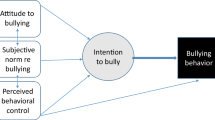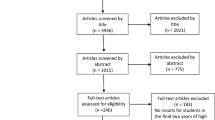Abstract
The first of two studies provided validity data on the Teacher Irrational Belief Scale that measures a set of beliefs of teachers previous research has found to be associated with teacher stress. Employing a sample of 850 primary and secondary teachers in Australia, an exploratory factor analysis resulted in four distinct factors: Self-downing, Authoritarianism, Demands for Justice, and Low Frustration Tolerance. These four sub-scales demonstrated adequate internal reliability and correlated with self-ratings of stress occasioned by different teaching stressors. In a second study, 140 teachers and 26 teachers retired from teaching because of stress completed the Teacher Irrational Belief Scale and a measure of teacher stress. Teachers retired from teaching due to stress scored higher on sub-scales of Self-downing and Low Frustration Tolerance than teachers still teaching. These results are discussed in terms of Ellis’ theory of REBT and implications for consultants and teacher educators offering stress management programs and support for teachers.
Similar content being viewed by others
References
Bermejo-Toro, L., & Prieto-Ursúa, M. (2006). Teachers’ irrational beliefs and their relationship to distress in the profession. Psychology in Spain, 10, 88–96.
Bernard, M. E. (1990). Taking the stress out of teaching. Melbourne, VIC: Collins-Dove.
Bernard, M. E., & Cronan, F. (1999). The Child and Adolescent Scale of Irrationality: Validation data and mental health correlates. Journal of Cognitive Psychotherapy: An International Quarterly, 13, 121–132.
Bernard, M. E., Joyce, M. R., & Rosewarne, P. (1983). Helping teachers cope with stress: A rational-emotive approach. In A. Ellis & M. E. Bernard (Eds.), Rational-emotive approaches to the problems of childhood. New York: Plenum Press.
Bora, C., Bernard, M. E., & Decsei-Radu, A. (2008). Teacher irrational belief scale—Preliminary norms for Romanian population. Romanian Journal of Cognitive and Behavioral Psychotherapies, 8, 35–49.
Chan, D. W. (2003). Hardiness and its role in the stress-burnout relationship among prospective Chinese teachers in Hong Kong. Teaching and Teacher Education, 19, 381–395. doi:10.1016/S0742-051X(03)00023-4.
Costello, A. B., & Osborne, J. W. (2005). Best practices in exploratory factor analysis: Four recommendations for getting the most from your analysis. Practical Assessment, Research and Evaluation, 8, 1–9.
DiGiuseppe, R., Doyle, K., Dryden, W., & Backx, W. (2013). A practitioner’s guide to rational-emotive behavior therapy (3rd ed.). New York: Oxford University Press.
Ellis, A. (1994). Reason and emotion in psychotherapy. New York: Birch Line Press.
Ellis, A., & Bernard, M.E. (Eds.) (1985). Clinical Applications of Rational-Emotive Therapy. New York: Plenum Press.
Fisher, M. H. (2011). Factors influencing stress, burnout, and retention of secondary teachers. Current Issues in Education, 14, 1–36.
Friedman, I. A. (2003). Self-efficacy and burnout in teaching: The importance of interpersonal-relations efficacy. Social Psychology of Education, 6, 191–215.
Geving, A. M. (2007). Identifying the types of student and teacher behaviours associated with teacher stress. Teaching and Teacher Education: An International Journal of Research and Studies, 23, 624–640.
Goddard, R., O’Brien, P., & Goddard, M. (2006). Work environment predictors of beginning teacher burnout. British Educational Research Journal, 32, 857–874. doi:10.1080/01411920600989511.
Harris, K. R., Haepin, G., & Haepin, G. (1985). Teacher characteristics and stress. The Journal of Educational Research, 6, 346–350.
Herman, K. C., & Reinke, W. M. (2014). Stress management for teachers: A proactive guide. New York: Guilford Press.
Jepson, E., & Forrest, S. (2006). Individual contributory factors in teacher stress: The role of achievement striving and occupational commitment. The British Journal of Educational Psychology, 76, 183–197. doi:10.1348/000709905X37299.
Jones, R. G. (1968). A measure of Ellis “irrational belief system’’, with personality and maladjustment correlates. Dissertation Abstracts International, 29, 4379 B–4380 B. (university microfilms. NO 696443).
Kalyva, E. (2013). Stress in Greek primary school teachers working under conditions of financial crisis. Europe’s Journal of Psychology, 9, 104–112. doi:10.5964/ejop.v9i1.488.
Khaledian M., Babaee, H., & Amani, M. (2016). The relationship of psychological hardiness with irrational beliefs, emotional intelligence and work holism. World Scientific News, 26, 86–100.
Kiviet, A. M. (2003). Sex differences in self-efficacy beliefs of elementary science teachers. Psychological Reports, 92, 333–338. doi:10.2466/pr0.2003.92.1.333.
Klassen, R. M., & Chiu, M. M. (2010). Effects on teachers’ self-efficacy and job satisfaction: Teacher gender, years of experience, and job stress. Journal of Educational Psychology, 102, 741–756. doi:10.1037/a0019237.
Kyriacou, C. (2001). Teacher stress: Directions for future research. Educational Review, 53, 27–35. doi:10.1080/00131910120033628.
Lazarus, R. S., & Folkman, S. (1984). Stress, appraisal, and coping. New York: Springer.
Lee, S. W., & Niileksela, C. R. (2014). Ecobehavioral consultation in schools: Theory and practice for school psychologists, special educators and school counselors. New York: Routledge.
McCarthy, C. J., Lambert, R. G., O’Donnell, M., & Melendres, L. T. (2009). The relation of elementary teachers’ experience, stress, and coping resources to burnout symptoms. Elementary School Journal, 109, 282–300. doi:10.1086/592308.
Popov, S., & Popov, S. (2015). The role of stressors at work and irrational beliefs in the prediction of teacher stress. Primenjena Psihologija, 8, 5–23.
Schonfeld, I. S. (1990). Coping with job-related stress: The case for teachers. Journal of Occupational Psychology, 63(2), 141–149. doi:10.1111/j.2044-8325.1990.tb00516.x.
Smith, T. W. (1989). Assessment in rational-emotive therapy: Empirical access to the ABCD model. In M. E. Bernard & R. DiGiuseppe (Eds.), Inside rational-emotive therapy: A critical analysis of the theory and practice of Albert Ellis. New York: Academic Press.
Terjesen, M. D., & Kurasaki, R. (2009). Rational emotive behavior therapy: Applications for working with parents and teachers. Estudos de Psicologia (Campinas), 26, 3–14.
Villa, A., & Calvete, E. (2001). Development of the teacher self-concept evaluation scale and its relation to burnout. Studies in Educational Evaluation, 27, 239–255. doi:10.1016/S0191-491X(01)00028-1.
Author information
Authors and Affiliations
Corresponding author
Ethics declarations
Conflict of interest
The author declares that he has no conflict of interest.
Rights and permissions
About this article
Cite this article
Bernard, M.E. Teacher Beliefs and Stress. J Rat-Emo Cognitive-Behav Ther 34, 209–224 (2016). https://doi.org/10.1007/s10942-016-0238-y
Published:
Issue Date:
DOI: https://doi.org/10.1007/s10942-016-0238-y




